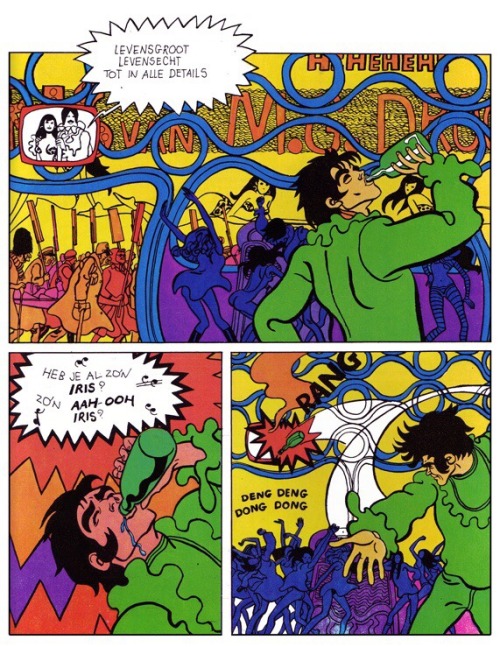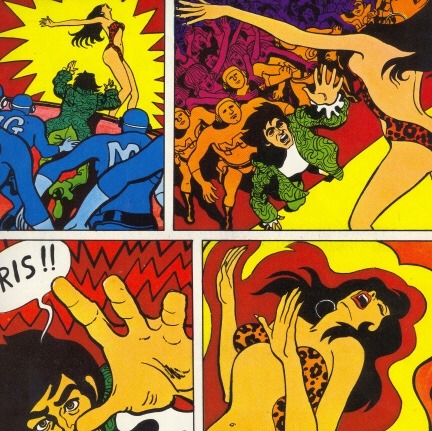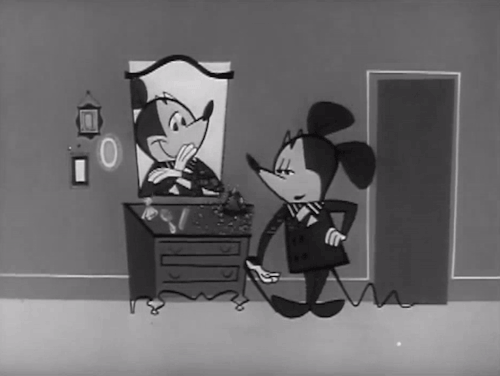Latest Posts by crycryaway - Page 4






Panels of comic strip TEENA, by Hilda Terry (1914-2006). Terry was the first woman allowed to join the National Cartoonists Society.
So well-drawn: so lean and economical, elegant. The actions and emotions of the loose-limbed teens populating the comic are always clear and bright, their poses free from the stiff clichés usually seen in teen comics. These examples are all from the 1950s.







ALICE IN WONDERLAND by Russian/Soviet artist, Maĭ Miturich. 1977.





José Antonio Guillermo Divito

Jack Davis

An Ad by Achille Mauzan such a weird artist but that’s part of the appeal and why his work is so charming.

Ernesto Garcia Cabral




Unfiltered perceptions: the wildly psychedelic comic Iris (1968) by Dutch illustrator, Thé Tjong-Khing.










Animated TV commercials from the 1950s and 1960s (with an emphasis on licensed cartoon characters).










Let’s start off with more Fleischer promotional art. Why do I find these so fascinating? Perhaps because they echo a time that is so definitely over, yet through these ads, it speaks, it winks, it’s going about its business, like the 1930s never ended.
I mean, place the ads in context: Marilyn Monroe is a little kid. World War II hasn’t started yet. Amelia Earhart flies from Honolulu to Oakland, Ca. The board game, Monopoly debuts.
These ads are like insects encased in amber.
More HERE, and HERE.

June, 1925 Cover of "Vanity Fair" magazine. From Poemaa's Flicker.

Brotherhood of Man (1945, UPA)
director: Bobe Cannon
designer: John Hubley

I Love Lucy (1952) Designer: Gene Hazelton

June, 1914 Cover "Vanity Fair" magazine. From vintag.es.com.

Eugene Hartung (1897-1973)
Mainzer Cats







Why not—here are all the remaining ones.
Brigitte Bardot photographed by Mark Shaw in 1956 while filming THE BRIDE IS MUCH TOO BEAUTIFUL.







Model sheets of Walt Kelly’s Pogo, and some art from The Pogo Special Birthday Special (1969), which was made by Chuck Jones and pretty much despised by Kelly.










Rico Tipo magazine art by Guillermo Divito

Cross-section of a Parisian house, 1885. From LA NATURE—REVUE DES SCIENCES ET DE LEURS APPLICATIONS AUX ARTS ET À L’INDUSTRIE.





Art from 1979 series, THE ROSE OF VERSAILLES, the story of Oscar François de Jarjayes, a girl raised as a boy at Versailles at the time of Marie-Antoinette.

Fantaisie d’Automne/Les Champignons. Illustration by George Barbier from LA VIE PARISIENNE, 1916.

A Two Party Line (1925)

Fantaisie d’Automne/Les Champignons. Illustration by George Barbier from LA VIE PARISIENNE, 1916.





A few vintage pulp sci-fi covers. With aliens, Amazons and monstrous Gods you never run out of ideas.






Parisian social life: French artist, Louis Legrand (1863-1951).





Concept drawings by Mel Shaw for Disney’s THE GREAT MOUSE DETECTIVE (1986).
I was 10. Across the street from us lived two beautiful twins. Dark hair, eyes as blue as robin’s eggs, long legs. They were older and usually hung out with my brother, but maybe he was sick that day or something, because it was just the twins and me in the theatre—two ravishing girls and in between them a kid with the biggest grin in the history of mankind on his stupid face. I was glowing radioactively. Jackie Wilson’s “I Get the Sweetest Feeling” was a hit I remember. Everything aligned, and the universe sang to me a little.






Illustrations from the LEGEND OF ZELDA instruction manual. 1986.

Egon Schiele, Self Portrait with Checkered Shirt, 1917


